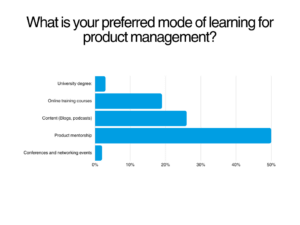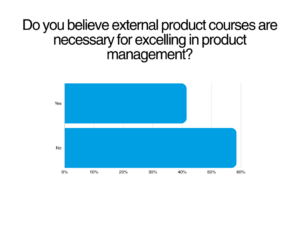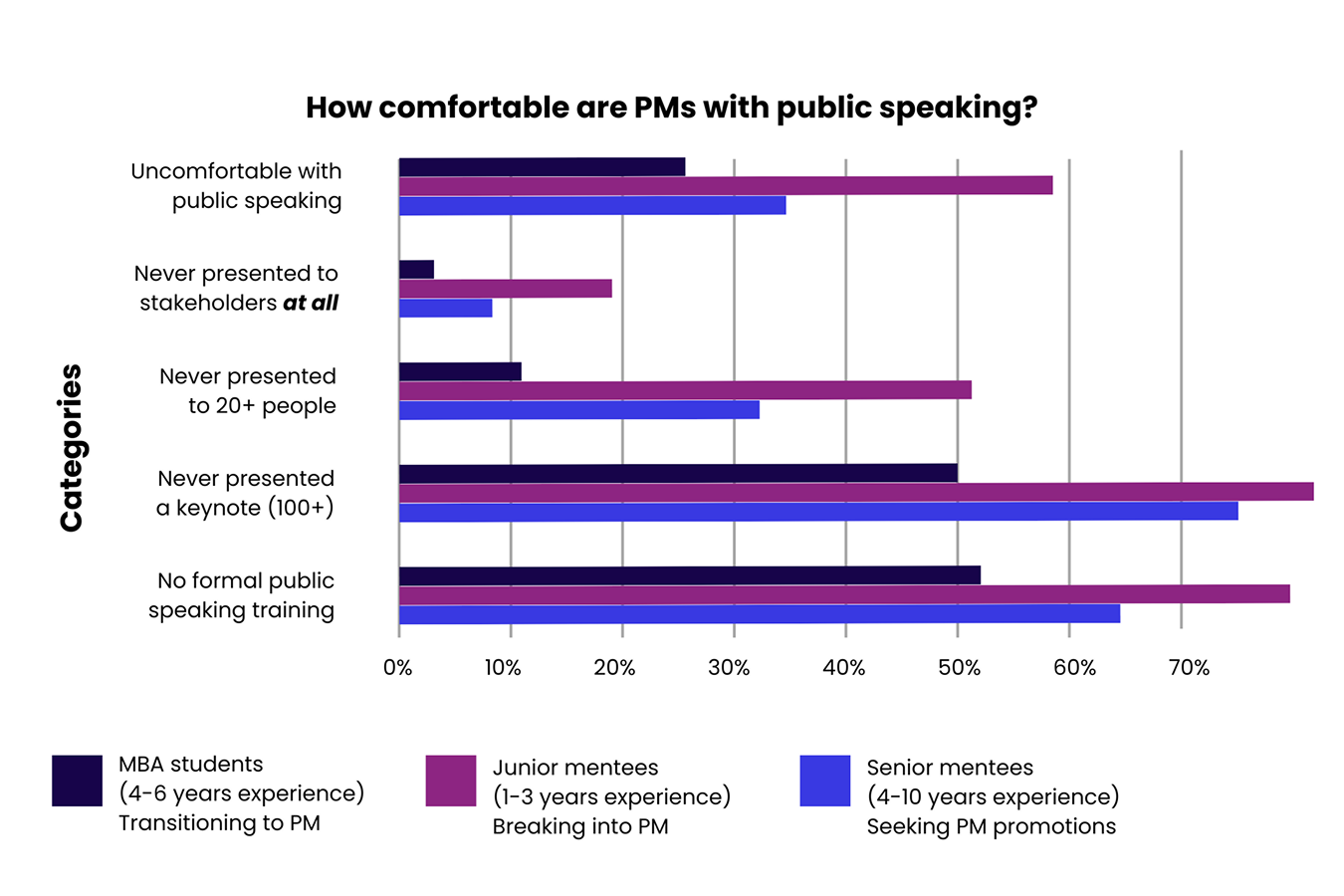You can’t fail to have noticed how the range of educational possibilities for product managers has exploded in the last few years. A happy combination of commercial opportunity and demand has led to a busy market with lots of options for learning: MBAs with product management specialisations, post-graduate diplomas, short-term training courses, conferences and networking events, books from thought leaders – you name it, it’s out there somewhere.
We thought it was time to take a closer look at what’s going on, and find out how the MTP community likes to learn.
MBAs and other tertiary-level qualifications
We took to social media and asked whether you think a university qualification in product management is beneficial to a career in Product – and about a third of you (32%) of you think it is. Greg Coticchia, CEO at Sopheon, sums up the views of many with this comment on LinkedIn: “Having run a masters degree program in product management I watched with interest the salary increases and placement of individuals in PM jobs where they didn't have them before or couldn't get them before. It accelerated their careers. Is it necessary or a requirement? No. Is it beneficial? Yes.”
It’s fair to say that the US leads the way here. In the US, an MBA has long been a popular route to higher pay, a better professional reputation and a better contact book – and US businesses have a strong history of recruiting MBA graduates. There are over 1,000 MBA courses in the US, compared with less than 150 in the UK. UK MBA courses are shorter than in the US – typically done and dusted in 12 months, as this post, USA vs UK MBA Programs, details. Increasingly, product management modules are appearing on MBA syllabuses in the US, and some US sites have had a go at ranking their suitability for a career in product management. For example, MBA application facilitator MBA&Beyond puts NYU Stern School of Business at the top of its list for product management, while coaching outfit Leland puts MIT Sloan at the top of its list.
It’s a different picture in Europe. At MTP, we haven’t found a European MBA with a specific focus on a career in product like some of the US MBAs – so if you know different, please let us know. There are a few post-graduate product management courses, for example this 12-month part-time course at TU Dublin. There’s also a postgraduate course called Become A Product Manager from King’s College London. Billed as a career accelerator, it’s a six-month part-time online course, aimed at people who want to break into product management. Otherwise there are some undergraduate product management courses and degrees, for example, this one at CODE University of Applied Sciences in Berlin.
Other ways of learning
There are lots of options for learning about product management: short courses from specialist trainers (Mind the Product included) conferences, networking events, thought leadership blogs, podcasts, mentors and so on. There are lots of options to choose from and lots of noise being made by their providers.
We conducted a few surveys on social media to see what the MTP community feels about these options, and the results are shown below.
Combine theory with experience
We also spoke to some product leaders, mentors and trainers to get their take on all the different ways available to learn about product management. As ever, they say, it’s a case of buyer beware. Randy Silver, co-host of MTP’s Product Experience podcast comments: “I think of training courses as a product and they're a great product for the provider. Training courses are a great first step, but they don't solve the problem of mastery and implementation and transformation in your company. In terms of getting people on the same page, giving them theory, and getting them familiar with things, they’re great. There's an art and a science to this. You can teach the science, but the art is something you have to develop and get through experience.”
It’s very easy to create a course and launch it on the internet. The barrier to entry is low so there are lots of courses available with varying degrees of quality, as leadership coach Dave Martin observes. He says: “There's a lot of content and a lot of courses, quite often advocated by people with a high profile on social media, which doesn't necessarily equate to thought leadership.” He’s seen courses that deliver a utopian idea of how product management should operate – which is different from its reality in practice: “The magic happens when you have educational expertise and field expertise coming together. Many of the offerings we see don't have that. You can’t learn to swim by reading about it. You've got to jump in the water, paddle about and sink. And jump in again and splash about until you figure it out.”
Find your learning style
Product leadership coach Petra Wille offers some practical advice on how to approach learning and development as a product manager. You need to find the time, know how you learn, and be able to apply what you learn. You also need to reflect on what you’ve learned, and ideally contribute to the product community, as this helps to close the learning cycle. Petra says: “I always tell product people, if you pick something, and even if you pick up a book, then only do so if you really know that you can use some of these techniques the next few months. Otherwise, it's a bit of a waste of time.”
She suggests finding allies who can help to curate your learning and give your feedback. They could be a mentor, a coach, peers in your company, or people at your local ProductTank. You also need a blueprint of what a competent product person looks like for your business so that you can compare your profile to this competent product person. Then, you can identify your knowledge gaps, your competency and skill gaps, and have a conversation on how to close them.
Cheap and effective ways to learn
Petra says that people usually know what their best learning style is, but sometimes they’re not brave enough to follow it. She says: “For example, I know lots of people who really like to read books with others – getting three or four people to read books together and then share their take on the book. But they never consider doing it within the company in a small book club. If four or five people want to learn more about jobs to be done, then why not read the jobs to be done book together? A book club is so cheap. Or maybe watch talks from conferences together as a group and discuss what you learned and what you heard. It’s so impactful.”
Product consultant and former Booking.com product leader Evie Brockwell has some advice for product people trying to decide where they need external input. She points out that in Product you don't need to be an expert in everything. Rather you need to assess what you enjoy doing, and where you want your career to get to, and then try and focus on those areas. She says: “You need that original reflection and strategy. So many organisations that don't even have an official career framework. It's not clear what you need to achieve to get promoted so people don't even have the tools to have a conversation about it. You need to take care of your own career. Look at where you want to get to, what gaps you think you have. Then do the research to find the best solution that's going to plug those gaps. Research and find something that is reputable, that is good value for money, and that's got good reviews.”
Evie has just started hosting a local product membership platform because she had lots of people coming to her who wanted one-to-one product management training, but couldn't afford the investment. She says: “We have monthly catch-ups on Product topics, people can send messages at any time, and they have questions on things like how to change careers, whether they should make a lateral move, how they can write a great CV. Most of the time it’s more basic stuff that people actually need, as opposed to high-level theory. I didn’t want to replicate things like Lenny's newsletter or the Mind the Product community, because they’re great for learning from lots of people at scale.”
What’s likely to change?
Historically, product people have come into the job from lots of different backgrounds. Petra says that 10 years ago she thought this would start to change as more universities began to run product management classes, but the change hasn’t happened. There’s still no single preferred route to a career in product management. This is partly because, as Dave Martin points out, the underlying foundations of the tech space are always moving. “If it was standardised we couldn't innovate,” he says.
Product manager education is a busy noisy market and the lack of standardisation in jobs and the way people work means that this is unlikely to change in the foreseeable future. There is however one area of product management education where the need for standards and legislation will have an impact, and that is of course artificial intelligence (AI). With the EU in the process of passing legislation on the regulation of AI, surely there will eventually be a standard way of working with AI which will need to be taught.









